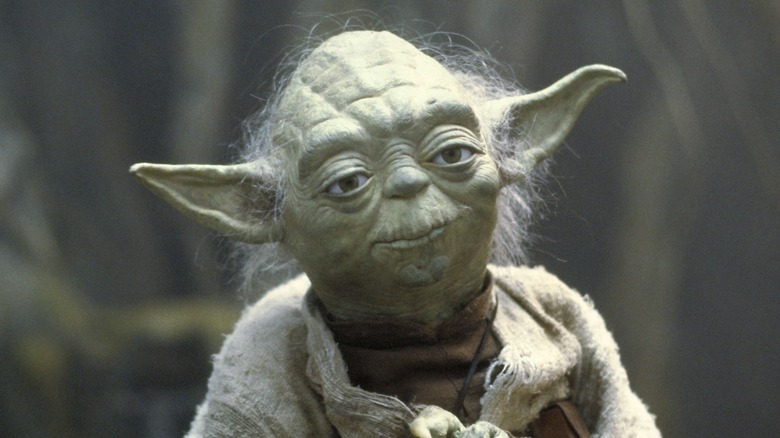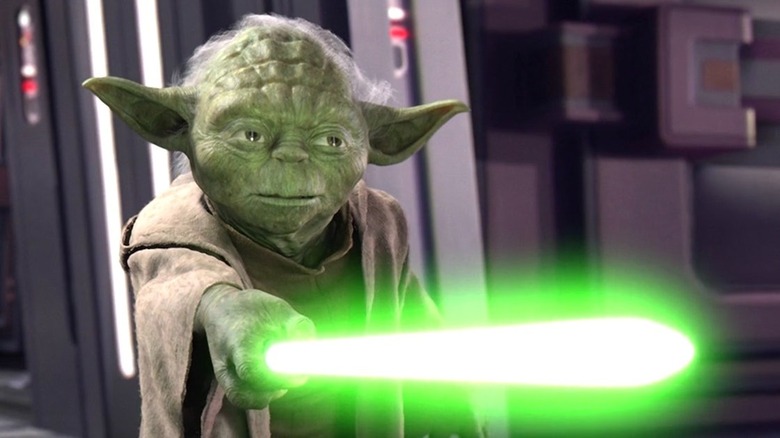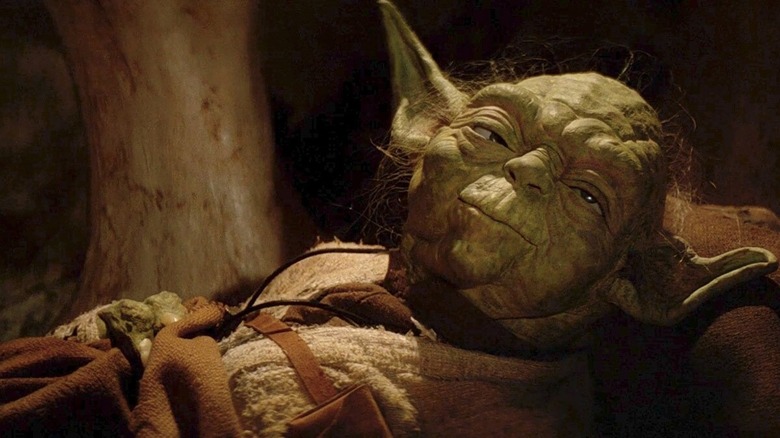Star Wars: The Real Reason Yoda Doesn't Use A Lightsaber In The Original Trilogy
Yoda is one of the most recognizable characters in all of "Star Wars" — at least, physically. In terms of characterization, he might actually be one of the more difficult to pin down. While his small green countenance and distinctive syntax are instantly identifiable, many fans have had trouble over the years justifying his different portrayals. In the original trilogy, he's a wise sage who speaks in spiritual poetry, imparting a holistic vision of the universe to Luke Skywalker. In the prequels, he's a dogmatic and militant religious leader willing to compromise the values of his order for fear of the dark side.
Of course, that discrepancy is the point. When Yoda says "Failed, I have" in "Revenge of the Sith," he's not just talking about his loss to Palpatine. He's admitting failure in a much larger way — a hubris and distortion of his own core beliefs that made him lead the Jedi into a violent war. His exile on Dagobah is an act of both survival and penance, and we never see him even pick up a lightsaber in the original trilogy or the sequels.
Yoda's shame is apparent if you just watch the original six films, but subsequent "Star Wars" texts have added more clarity to his abandonment of the lightsaber. The canon 2019 comic "Age of Rebellion Special" #1 includes a short story about Yoda in exile called "The Trial of Dagobah." In it, we learn that he vowed never to pick up his weapon again after the Clone Wars, as he viewed it as a symbol of his mistakes.
For Yoda, his lightsaber represented his failure
In "The Trial of Dagobah," Yoda goes on a hunting trip on Dagobah after running low on food in his hovel. Upon his arrival at the valley where he hunts, the narrator mentions that Yoda won't use his lightsaber for such a simple task and doesn't even have it on him. "In any case," we're then told, "he resolved long ago he would never wield another lightsaber. As part of his penance. For the hubris that led to the fall of his order. For the blindness that led to his exile. For the shame of knowing that the consequences of that failure even now continue to plague the galaxy. No, he will not swing a Jedi's lambent blade again."
It's a pretty brutal moment. Clearly, Yoda is still living with immense guilt, even nearly two decades after the rise of the Empire (the comic takes place on the same day Luke Skywalker lands on Dagobah). On his way home, he falls into a pit and is pinned down by rubble. "Oh, Yoda. Foolish you are," he thinks to himself. "If had a lightsaber you did, cut yourself out of this predicament you could." In this moment, though, he doesn't give into despair, ultimately realizing that his shame and grief have held him back from the Force. "A true Jedi is never in need of a lightsaber," the narrator says as Yoda calls on the power around him to escape. "Not when the Force is his ally."
Yoda's perspective on lightsabers reflects his complete Jedi journey
Not only does Yoda never use a lightsaber in the original "Star Wars" trilogy, but he never even trains Luke in the weapon's use. Obi-Wan teaches Luke basic saber forms and exercises, but Yoda only instructs him in the ways of the Force — how to use it for defense, yes, but also for knowledge. "Luminous beings are we," Yoda says in "The Empire Strikes Back," gesturing at Luke and the swamp around them overflowing with life. Being a Jedi is so much more, he finally realizes, than the skill to wield a weapon, even for good reasons. His power is based in a sense of powerlessness; he understands that he is only a tiny piece of the living universe, and that that's the most significant thing one can be.
Yoda still holds onto his lightsaber as a talisman of sorts, as Luke retrieves it and offers it to Grogu years later. Given Yoda's journey, it's interesting that the younger greenling rejects the weapon. Yoda may see the lightsaber as a symbol of his failure, but that doesn't mean it's something to be forgotten. In "The Trial of Dagobah," he remembers that "for a Jedi, failure is the greatest teacher" — a lesson he imparts to Luke decades later in "The Last Jedi."
Like Yoda, Luke doesn't use his lightsaber in his final living moments, instead leveraging a massive display of Force mastery to fend off Kylo Ren. He recognizes, as his teacher does, that violence is never something a Jedi should be proud of.


